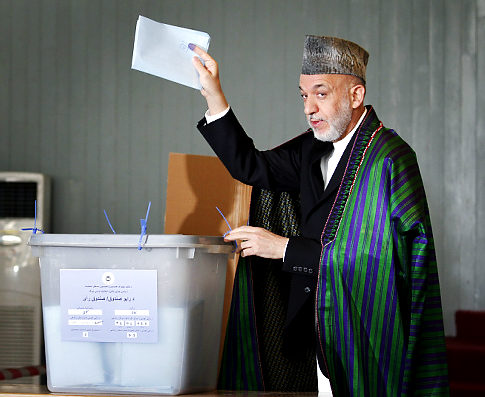Afghanistan Feature: An Election (and More) Gone Wrong (Gall/Khapalwak)
 On Wednesday, The New York Times posted this account by Carlotta Gall and Ruhullah Khapalwak. The article is in sharp contrast to Gall's reporting this autumn of US military success in the campaign against insurgency in Afghanistan:
On Wednesday, The New York Times posted this account by Carlotta Gall and Ruhullah Khapalwak. The article is in sharp contrast to Gall's reporting this autumn of US military success in the campaign against insurgency in Afghanistan:
The inauguration of a new Parliament in just weeks threatens to worsen ethnic tensions and instability and to drive an important part of President Hamid Karzai’s political base into the arms of the insurgency, Afghans and foreign officials warn.
Despite numerous obstacles, NATO and American officials had pushed strongly for parliamentary elections in September, gambling that a successful vote would show progress in the war and new growth in Afghanistan’s democracy.
Instead insecurity, disaffection and fraud, particularly in the south, left the country’s largest and most important ethnic group, the Pashtuns, with sharply reduced representation. The results have been vigorously disputed for three months and have pushed the country to the brink of a constitutional crisis.
Now a range of Afghan officials and losing candidates say the election could have much the opposite effect from what many here had hoped. Seating the new Parliament, they warn, could fuel the insurgency and even the kind of ethnic strife that might lead to civil war.
“Step by step Pashtuns will say we are not represented, the government does not care about us, our people are not in government, and step by step they will join the enemy,” warned Jamil Karzai, a former member of Parliament and cousin of the president.
He is among a group of some 80 losing candidates who are challenging the results. Many, particularly among the Pashtuns, are demanding a recount or that the election be annulled, saying the results have been manipulated to create a new Parliament heavily weighted toward northern ethnic minorities.
Mr. Karzai has tried to stay aloof from the dispute. Under pressure from the election commission and Western governments, he announced last week that the Parliament would be seated as planned on Jan. 20, an apparent acceptance of the results, even though they reduce his support in Parliament among his fellow Pashtuns.
Still, his chief of staff, Umar Daudzai, said Mr. Karzai was responsive to the complaints of some candidates of “fraud, misconduct and miscounting,” as well as the greater concern of widening ethnic divisions.
“For the past 10 years, one of the major achievements was that every group felt they had an equal share in the state structure and that should not be disrupted,” Mr. Daudzai said in a telephone interview.
Mr. Karzai has sent the complainants to his attorney general, who has already passed their case to the Supreme Court. “We trust the Supreme Court will be responsive to their complaints,” Mr. Daudzai said. He suggested that a verdict that brought a recount or adjustment to some of the results might answer concerns of fraud and the larger issue of Pashtun disenfranchisement.
But few believe the Supreme Court can deliver satisfaction at this late hour, and two government officials said Mr. Karzai knew the Parliament was past remedy. Already the suggestion that the Supreme Court, which rules on constitutional issues, could override the Independent Election Commission, which operates under the electoral law, has led the attorney general and election officials to trade threats.
A number of losing candidates are also blaming the president for allowing a decline in Pashtun influence, and warn that there is little hope for Afghanistan to achieve peace and security without incorporating the Pashtuns, who form most of the ranks of the Taliban.
The Pashtuns, who make up about 46 percent of the population, have traditionally ruled the country, but have become increasingly alienated from the government as war has engulfed their regions and they have been squeezed between Taliban insurgents and NATO and government offensives.
Under such conditions few Pashtuns were able or cared to vote, but they will see the reduction of Pashtun seats as one more slap in the face, Parliament members and officials warned.
The Pashtuns have lost at least 26 seats in the new Parliament — dropping from 120 to 94 in the 249-seat lower house, according to Mirwais Yassini, a legislator. Others say the number is even lower.
Several predominantly Pashtun provinces and some important tribes have little or no representation in the new Parliament, a situation that flies in the face of NATO’s strategy of winning over the Pashtuns by increasing their stake in the government.
“It is difficult for Karzai, and for NATO, too,” said one senior government official, who spoke on condition of anonymity. “For the country it is not good.”
Part of the problem was created by the aftermath of Mr. Karzai’s own fraud-ridden presidential election in 2009. The fear of a repeat of such fraud led the newly appointed election commissioner, Fazal Ahmad Manawi, to ban many of the most insecure areas from holding elections for Parliament. As a result, many of the Pashtun areas and tribes hit hardest by the insurgency could not vote.

 Friday, December 31, 2010 at 8:09
Friday, December 31, 2010 at 8:09
Reader Comments